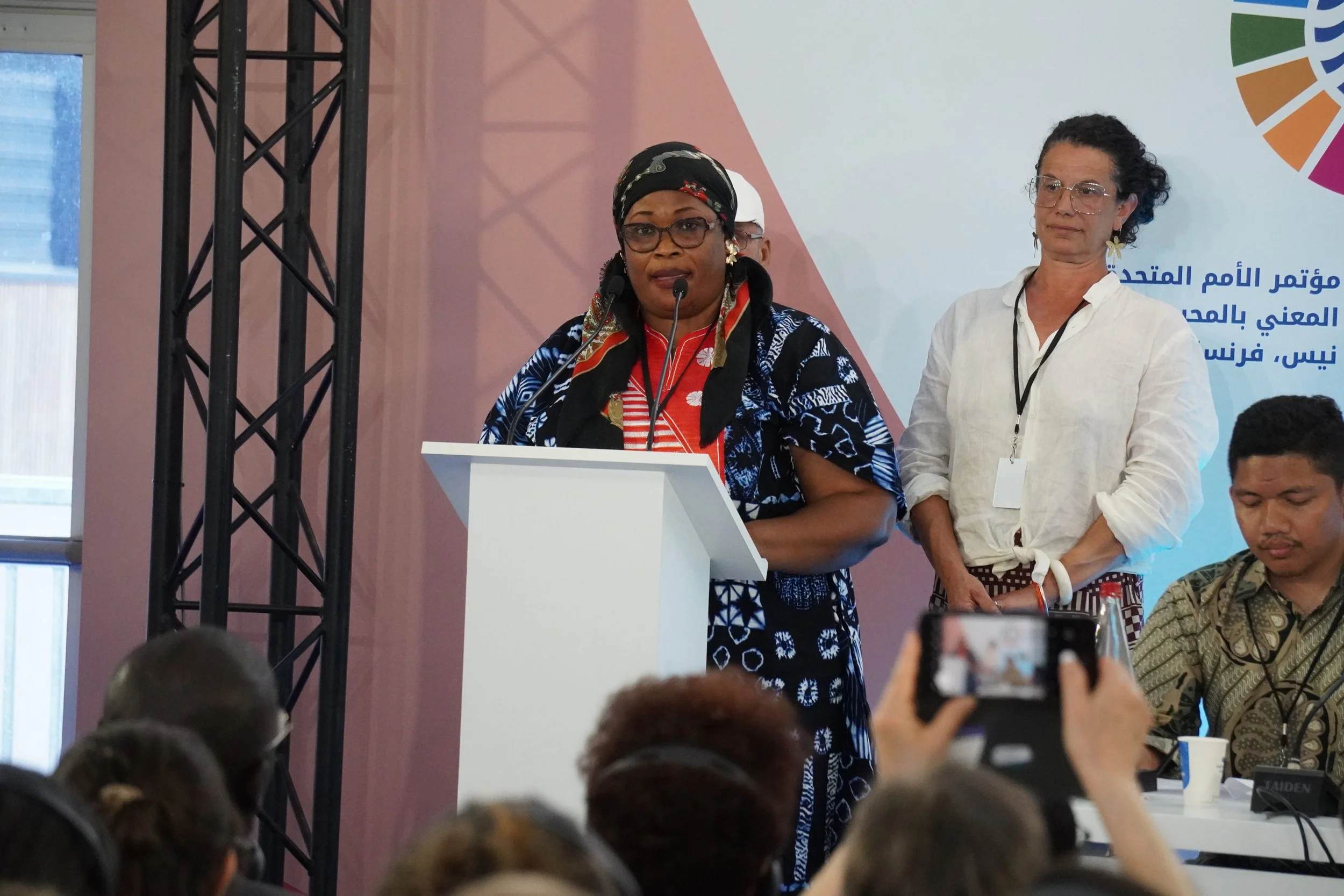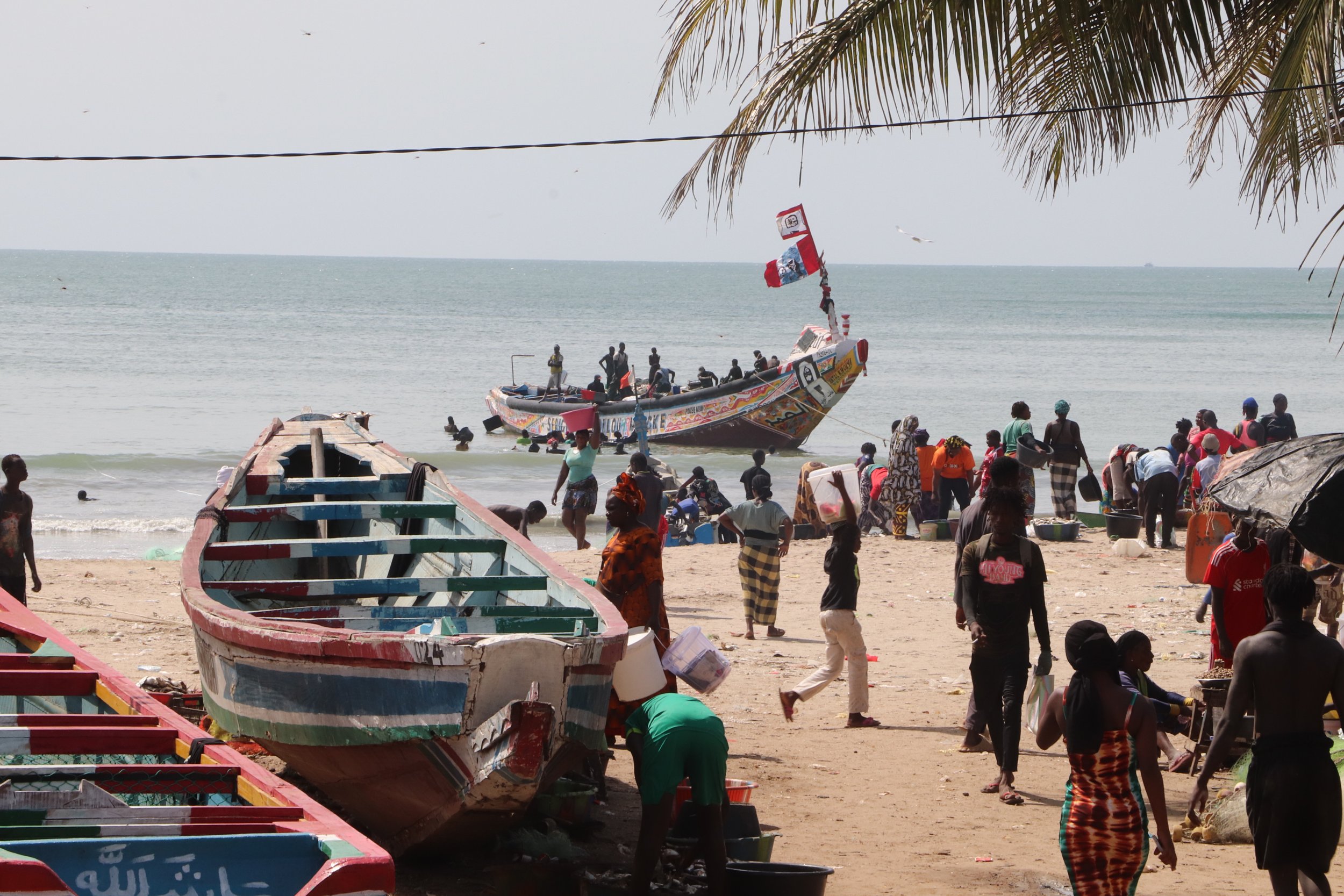At a time when the ocean sits at the intersection of climate, economic, and social challenges, the Third United Nations Ocean Conference (UNOC3), held in Nice (France) from 9–13 June, marked a pivotal moment in shaping the future of global ocean governance.
Among the many voices who will be shaping this future, small-scale fisheries communities still face an uphill struggle to have their voices fully heard. These men and women, who rely directly on the sea for their livelihoods and play a vital role in the sustainable management of marine resources, are too often left on the fringes of decision-making processes that will affect their futures.
Determined to change this, representatives of small-scale fisheries from Africa, South and Central Americas, Asia, Europe, and the Pacific came together at UNOC3. Aware of the need to make their voices heard, they organised their own side-event titled "Small-scale fisheries: At the heart of ocean governance and food security". In a spirit of solidarity and dialogue, 40 small-scale fishers—men and women from 25 countries, collectively representing over 12 million people—continued the momentum begun at the Lisbon conference in 2022, reinforcing the principles set out in the Call to Action from Small-Scale Fisheries. Their message was clear: small-scale fisheries are essential to sustainable ocean management and food security, and must be integrated into governance through a human rights-based approach. A series of concrete recommendations emerged from these rich discussions, which participants went on to present across other forums of the conference.
1. Guaranteeing preferential access to coastal communities
“This is why we say: small-scale fishers must be given priority access to coastal areas. Governments must stop treating small-scale fishers like squatters on their own shores. We need legal recognition of our access rights to land, to water, to fish resources.””
The event, coordinated by Rise up for the Ocean, brought together policy-makers nd small-scale fishers from African and Asian nations to showcase positive outcomes where communities are granted preferential access to coastal waters and a role in co-management.
Nancy Ramkalawan-Onginjo, President of the Seychelles Fishing Boat Owners Association (SFBOA), a member organisation of the African Confederation of Professional Organisations of Artisanal Fisheries (CAOPA), regretted that "these areas are often ignored, unprotected or invaded by industrial vessels. This situation creates injustice, destroys our livelihoods and coastal ecosystems, and exacerbates poverty in our communities". She emphasised that solutions do exist and must involve the direct participation of affected communities: "co-management enhances transparency, reduces conflict, and enables decisions to be taken that are adapted to the reality on the ground (...) it is also a lever for social justice and efficiency, because it gives a voice to small-scale fisheries communities, which have traditionally been marginalised".
2. Ensuring the participation of women and supporting their role in innovation
At the official round table on the importance of sustainable food from the oceans, Raïssa Nadège Leka Madou, a women fish processor and fishmonger from Côte d'Ivoire, spoke on behalf of CAOPA. She also leads the cooperative "Faveur divine", which is a member of the union of cooperatives of women fish processors and fishmongers in Côte d'Ivoire. Ms Madou described the daily struggles of women in the sector: "We battle smoke from the ovens, the absence of a cold chain, declining catches—all while thinking of our children's future."
Raïssa Madou speaks at the official SSF side event: “In several African countries, fishing communities that manage their own marine protected areas have seen fish stocks recover.” Photo: Joëlle Philippe.
She called for investment in practical solutions like improved ovens and solar-powered refrigeration, and urged political leaders to provide financial backing that ensures decent working conditions and strengthens women's central role in coastal community cohesion.
Mercy Mghanga, president of the Coastal Women in Fisheries Entrepreneurship Association spoke aboard the German research vessel Meteor during a session on ocean justice, addressed the prejudices surrounding the work of women in the fishing industry: "We women fishers and processors, women in the fishing industry, are often perceived as having no knowledge or education. We are often looked down upon. Nevertheless, we are proving them wrong: our sector can be lucrative and guarantee us a livelihood", she says, but makes it clear that for this to happen, they need the right political and financial support.
3. Involve small-scale fishers in ocean governance.
In a moving address to the plenary, Sandrine Thomas, a fisher from Royan, France, urged UN member states: "Let us be part of the decisions and treaties that affect us. (…) Give us the chance to pass on our knowledge to the next generation. We have hope—hope to be heard, hope to be respected."
At a press conference with fishers from every continent, Papa Cá, president of a fishers' association in Guinea-Bissau, underlined the need to recognise small-scale fisheries as strategic conservation partners. But, he warned, this goal cannot be realised without investment across the value chain to support sustainable growth and innovation. Zoila Bustamente, President of the Latin American Union of Artisanal Fishers (ULAPA) and the National Confederation of Artisanal Fishers of Chile (CONAPACH), echoed his point: "This why we are here: to remind you that we are an integral part of what you aim to protect. Nothing should be decided without the world's small-scale fisheries communities.”
With the help of interpreters, small-scale fishing representatives were able to speak in their own languages. As most UNOC3 side events were held in English, this posed a barrier for non-English speakers. Interpretation remains a crucial tool for ensuring inclusive and equitable dialogue. Photo: Press conference of small-scale fisheries representatives at UNOC3, by Joëlle Philippe.
Meanwhile, Mauritania and the Sub-Regional Fisheries Commission hosted an event dedicated to strengthening transparency in fisheries governance, from coastal areas to the high seas. Gaoussou Gueye, President of CAOPA, advocated for participatory surveillance in the fight against illegal, unreported, and unregulated (IUU) fishing. He called on governments and international institutions to fully involve small-scale fisheries communities: "Fishers must be involved from the outset. They can play an active role, but only if this involvement is backed by consistent and adequate support – such as public funding for equipment like infrared cameras, catch registers, and traceability systems."
4. Enhancing local knowledge and building capacity for sustainable co-management
At the SSF side event, Gwen Pennarun, President of the Association des pêcheurs à la ligne de la Pointe de Bretagne and of LIFE (Low Impact Fishers of Europe), emphasised the value of fishers’ deep-rooted connection to their local environments. He noted that their intimate understanding of the sea often results in viable, sustainable solutions. Co-management systems that incorporate this empirical and traditional knowledge have already proven effective in parts of Europe, but their broader implementation continues to be hindered by a lack of political will and supportive legal frameworks.
On board the Meteor, men and women from artisanal fisheries were invited to share their perspectives at events focused on aquatic food systems and their importance to food security. Photo: Model of the Meteor, by Mamadou Aliou Diallo.
On board the Meteor, the German development agency (GIZ) led discussions on bridging science, policy, and society for sustainable ocean management in West Africa. Gueye reinforced the importance of integrating fishers' practical expertise: "A fisher can tell which fish has bitten the line just by the way he pulls. No scientist can do that".
*
All in all, this intense week was marked by a strong commitment from small-scale fisheries. The Call to Action from Small-Scale Fisheries remains a foundational document, urging governments to develop robust national action plans in alignment with the FAO Voluntary Guidelines for sustainable small-scale fisheries and the 30x30 objective to protect the oceans. UNOC3’s final political declaration confirmed this direction, calling for greater adoption of participatory management systems.
In the words of Dr Paubert Mahatante Tsimanaoraty, Madagascar’s Minister of Fisheries and the Blue Economy, who praised the event as "the most interesting and dynamic of the entire conference", the message is clear: now is the time to transform political goodwill into meaningful, inclusive action. Small-scale fisheries must be at the heart of a sustainable ocean future.
Header photo: Felicito Núñez, a Garifuna fisher from Honduras, holding up the SSF Call to Action, during the SSF side event, by Joëlle Philippe.









The BBNJ Agreement reshapes the governance of fisheries without imposing direct regulations: high seas MPAs could displace fishing effort into African EEZs, potentially increasing competition to access for small-scale fisheries. At the same time, the treaty legitimizes negotiated and community-based spatial management tools.